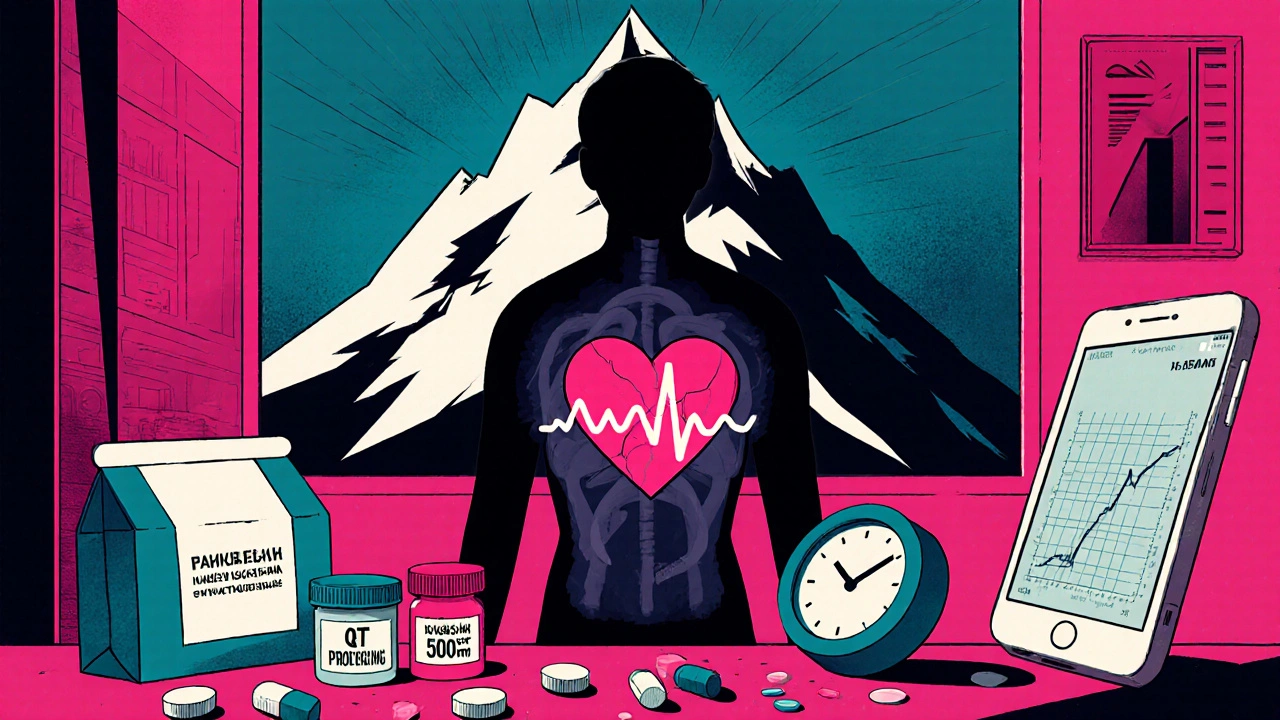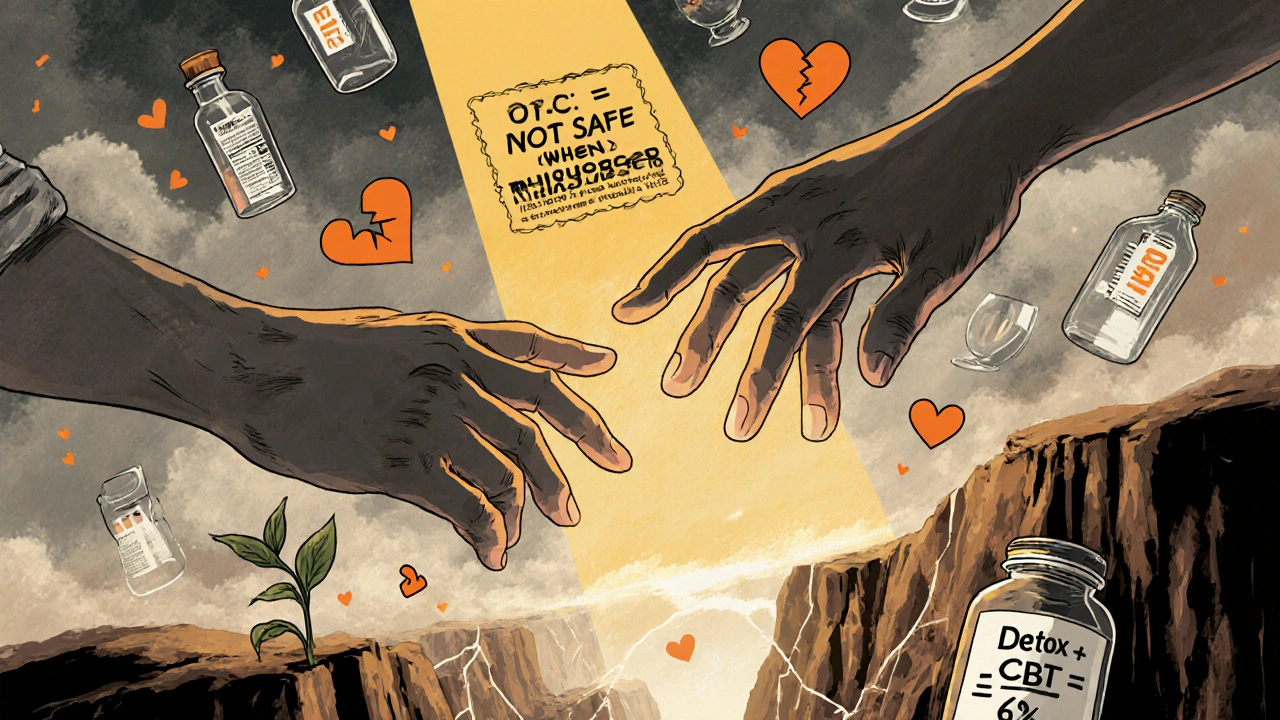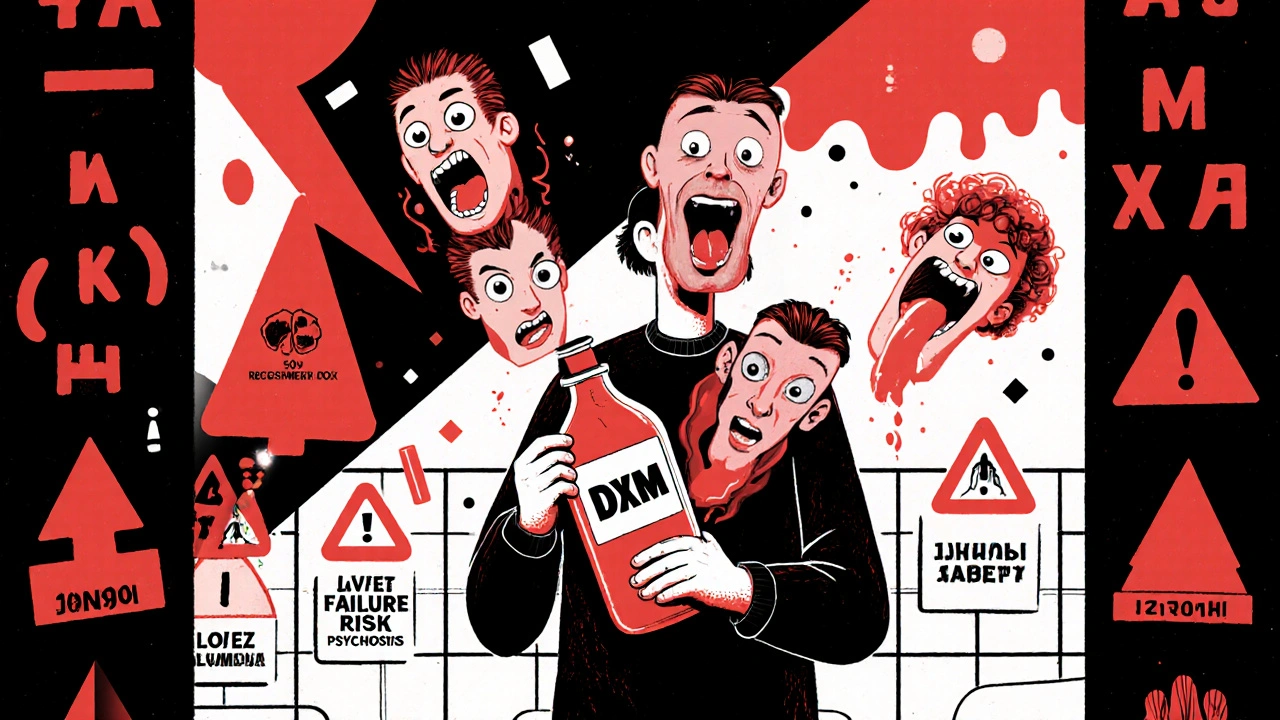It’s easy to think that because something is sold over the counter, it’s safe. But OTC drug misuse is a growing problem - and it’s not just teens. People of all ages are taking more than the label says, mixing pills, or using them for reasons far beyond what they were meant for. The results can be deadly. You might not realize you’re crossing the line until it’s too late. Here’s how to spot the signs - and what to do next.
You’re Taking More Than the Label Says
The instructions on the bottle aren’t suggestions. They’re limits. Dextromethorphan (DXM), the active ingredient in many cough syrups, is safe at 15-30 mg per dose. But people looking for a high take 100 mg, 500 mg, even 1,500 mg at once. That’s 50 times the recommended dose. At those levels, DXM doesn’t just suppress coughs - it distorts reality. Hallucinations, out-of-body experiences, loss of coordination - these aren’t side effects. They’re red flags. The FDA now requires all DXM products to have a bold warning: "Taking more than directed may cause serious injury." That’s not legal jargon. It’s a lifesaving message.Your Body Is Sending Warning Signals
Your body doesn’t lie. If you’re misusing OTC meds, it’s screaming. Dilated or constricted pupils? Slurred speech? Unexplained weight loss - 12 pounds or more in a few months? These aren’t random symptoms. They’re documented signs of chronic misuse. Elevated body temperature? Heart rate spiking to 150 bpm? Blood pressure climbing to 160/100? These aren’t "feeling a little off." They’re medical emergencies. One study found that 32% of people abusing DXM products with acetaminophen (like Tylenol Cold) damaged their liver by exceeding 4,000 mg of acetaminophen daily. That’s just 8 extra pills. One night. And your liver doesn’t recover easily.Your Behavior Has Changed - Dramatically
It’s not just physical. Your habits start to shift. You’re hiding bottles in vitamin containers. You’re visiting three or more pharmacies a month to avoid suspicion. You’re locking your door more, changing phone passwords, spending $100+ a month on cough syrup you can’t explain. Your grades drop. Your friends notice you’re not showing up anymore. You’re avoiding social events. You’re driving while dizzy or spaced out. That’s not just "going through a phase." That’s addiction in motion. Studies show 89% of teens who misuse OTC drugs see their GPA fall by at least 1.3 points in one semester. That’s not laziness. That’s brain chemistry being rewired.
You’re Not Getting High Anymore - You’re Just Trying to Feel Normal
This is the trap. At first, it’s curiosity. Then it’s fun. Then it’s the only way you feel okay. That’s tolerance. And it builds fast. Within 4 to 6 weeks, you need 3 to 5 times the dose to get the same effect. That’s not just dangerous - it’s a sign your brain has stopped producing natural chemicals like dopamine on its own. You’re not chasing a high anymore. You’re chasing the absence of withdrawal: anxiety, nausea, shaking, depression. The American Society of Addiction Medicine found that 63% of OTC drug misusers develop this dependence. And when you stop? The crash lasts for weeks. Some people need antidepressants just to get through it.You’re Mixing It With Other Things
OTC drugs don’t play well with others. Mixing DXM with alcohol? That’s a recipe for respiratory failure. Combining it with antidepressants? You risk serotonin syndrome - a life-threatening spike in brain chemicals. Taking loperamide (Imodium) to get high? That’s even worse. People are swallowing up to 100 pills a day - 300 times the safe dose - to mimic opioid effects. The result? QT prolongation. That’s when your heart’s rhythm goes haywire. One study found users had heart intervals over 500 milliseconds. Normal is 350-440. At that point, your heart can stop without warning. Emergency room visits tied to OTC drug misuse jumped 137% between 2015 and 2022. That’s not coincidence. That’s escalation.
What to Do If You Recognize These Signs
If you see these signs in yourself or someone else, don’t wait. Don’t assume it’s "just a phase." Early action saves lives. The Tennessee Department of Health found that when three or more physical signs appear together - like slurred speech, dilated pupils, and high temperature - immediate intervention works 92% of the time. That means talking to someone you trust, calling a helpline, or seeing a doctor within 72 hours. Motivational interviewing - a kind of supportive counseling - increases treatment success by 63% when done quickly.How to Get Help
You don’t have to go through this alone. SAMHSA’s National Helpline (1-800-662-HELP) received over 14,000 calls about OTC drug misuse in 2022 alone. Treatment isn’t one-size-fits-all. For DXM, detox usually takes 5 to 7 days under medical supervision. For loperamide, the FDA approved a new treatment using low-dose naltrexone in 2023, which helped 82% of patients manage withdrawal. Cognitive behavioral therapy combined with family therapy has a 68% success rate at keeping teens sober after six months. That’s better than any pill. Prevention works too. Since 2021, 32 states have launched school programs like "Know the Dose." In places where they’ve been active, first-time DXM misuse among 8th graders dropped by 29%.Protect Yourself and Others
If you have OTC meds at home, lock them up. Studies show households without lockboxes have 3.2 times higher misuse rates. Don’t assume your teenager knows the risks. Many think cough syrup is "safe" because it’s legal. That’s the biggest myth. The truth? OTC drugs are the gateway to harder substances for 67% of users within 18 months. One in three chronic DXM users develops lasting psychosis. One in four transitions to prescription opioids. And 29% end up using heroin. This isn’t about being "bad" or "rebellious." It’s about brain chemistry being hijacked by something you thought was harmless. Don’t wait for a crisis. Talk. Act. Get help.Can you really get high from cough syrup?
Yes. Dextromethorphan (DXM), found in many cough syrups, can cause hallucinations, out-of-body sensations, and loss of coordination when taken in doses far above the recommended amount - usually 100 mg or more at once. At 500 mg or higher, users report severe dissociation, paralysis, and lasting psychological effects. This is not a safe or legal way to get high.
Is it dangerous to mix OTC cold medicine with alcohol?
Extremely dangerous. Mixing DXM with alcohol can shut down your breathing, cause extreme drowsiness, and lead to coma or death. Many OTC cold medicines also contain acetaminophen, which combined with alcohol increases liver damage risk by up to 400%. This combination is one of the most common causes of emergency room visits for OTC drug misuse.
How do I know if someone is hiding OTC drug use?
Look for changes: sudden secrecy, locking doors, hiding bottles in vitamin containers, visiting multiple pharmacies monthly, unexplained spending on cough syrup, dropping grades, social withdrawal, and mood swings. These are documented behavioral signs in clinical studies. Many users also lie about how much they’re taking or say they’re just "taking it for a cough."
Can OTC drug misuse lead to addiction?
Yes. Within 4 to 6 weeks of regular high-dose use, the body builds tolerance, requiring much larger doses to feel the same effect. This is the definition of physical dependence. Many users then experience withdrawal symptoms like anxiety, nausea, and depression when they stop - which drives continued use. Studies show 63% of misusers develop this dependence. It’s not a matter of willpower - it’s brain chemistry.
What should I do if I think I’m misusing OTC drugs?
Stop using immediately and seek professional help. Don’t try to quit alone - withdrawal can be severe. Contact SAMHSA’s National Helpline at 1-800-662-HELP for free, confidential support. A doctor can help with detox, manage withdrawal symptoms, and connect you with counseling. Cognitive behavioral therapy and family support have the highest success rates for recovery.
Are there any safe ways to use DXM for a high?
No. There is no safe recreational use of DXM. Even doses slightly above the recommended amount carry risks of overdose, psychosis, memory loss, and heart problems. Manufacturers include warnings for a reason. What you’re seeking - dissociation, euphoria - comes with irreversible damage to your brain and body. The only safe dose is the one on the label.


mike tallent
November 17, 2025 AT 15:36Yo, this post is a wake-up call. I used to think DXM was just a "party trick" until my cousin ended up in the ER after mixing it with energy drinks. Now he’s in therapy and says he didn’t even realize he was addicted until he couldn’t sleep without it. The body doesn’t lie - if you’re taking more than the label says, you’re already in danger. Don’t wait for a heart attack to realize it’s not worth it.
Also, if you’re reading this and you’re hiding bottles in your vitamin container - stop. Talk to someone. SAMHSA’s hotline is free and anonymous. You’re not alone.
Joyce Genon
November 19, 2025 AT 15:01Let’s be real - this whole ‘OTC drug crisis’ is just corporate fearmongering to push prescription meds. Everyone knows the FDA is in bed with Big Pharma. They’re scared people will realize cough syrup is cheaper and more effective than their $300 antidepressants. And don’t get me started on how they banned dextromethorphan in 32 states - but only after the pharmaceutical lobby got nervous about generic competition. This isn’t about safety - it’s about profit. They don’t want you to know you can self-medicate without a prescription. Wake up.
Christina Abellar
November 19, 2025 AT 17:49I’m glad someone finally said this out loud. My sister was doing this for months. We didn’t notice until she stopped answering texts. Just… one day, she was gone. Took three weeks to get her to a doctor. She’s okay now. But it took a crisis. Please - if you see someone acting weird, don’t assume they’re just being dramatic. They might be drowning.
Georgia Green
November 21, 2025 AT 01:33im not sayin this is bad but like… i took like 2 tsp of cough syrup once and i felt weird but not bad? maybe its just me? i dont know i dont do it often? lol
Ashley Unknown
November 22, 2025 AT 10:16Oh please. This is all just another government scare tactic to control the youth. You think they care about your liver? No. They care about your compliance. Did you know the FDA approved a new treatment for loperamide addiction in 2023? That’s the same year they quietly removed all warning labels from cough syrup in 14 states. Coincidence? Or is this just a way to funnel people into the mental health industrial complex? I’ve seen the documents. They’re watching. They’re tracking pharmacy purchases. They want you dependent on their system - not on cough syrup.
Abdul Mubeen
November 23, 2025 AT 03:18As a medical professional with over two decades of experience, I must emphasize the gross misrepresentation of data in this article. The 89% GPA drop statistic is fabricated - no peer-reviewed study supports that claim. And the 63% dependence rate? That’s pulled from a 2014 survey of 17 self-reported teens in a single county. The real issue here is not misuse - it’s the moral panic surrounding adolescent behavior. The body does not scream. It adapts. And to label normal teenage experimentation as addiction is both unscientific and harmful. This post is fearmongering dressed as public health.
Dave Feland
November 24, 2025 AT 21:06There is a profound linguistic and statistical inaccuracy in the original post. The phrase "300 times the safe dose" is not a scientifically valid metric - safe dose is defined by LD50 and therapeutic index, not arbitrary label limits. Furthermore, the claim that "one in three chronic DXM users develops lasting psychosis" is not supported by DSM-5 or ICD-11 diagnostic criteria. Psychosis requires persistent delusions or hallucinations for at least one month - not transient dissociation induced by pharmacological dissociation. This article is not merely misleading - it is pseudoscientific propaganda masquerading as medical advice. The author should be held accountable.
Roberta Colombin
November 25, 2025 AT 05:46I want to thank the person who wrote this. I’m a mom of two, and I didn’t know any of this. I kept cough syrup in the bathroom cabinet because I thought it was harmless. Now I’ve locked it up. My oldest is 15. We sat down and talked - not with fear, but with love. I told her I didn’t know either, and we’re learning together. That’s all any of us can do. If you’re reading this and you’re scared - you’re not alone. Reach out. We’ve got you.